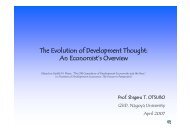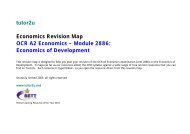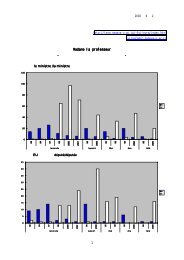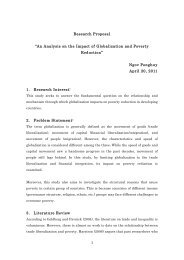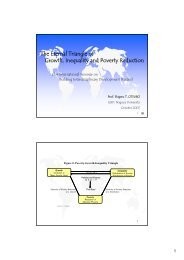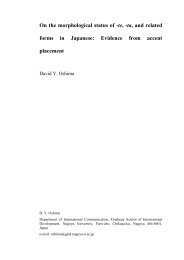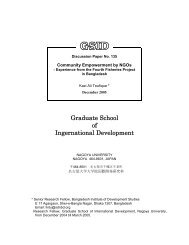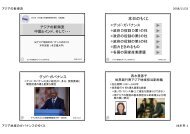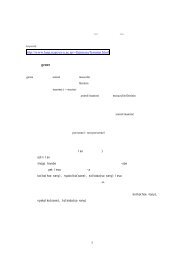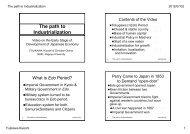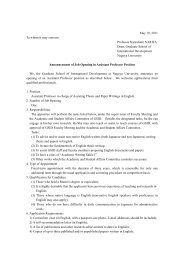Report
Report
Report
Create successful ePaper yourself
Turn your PDF publications into a flip-book with our unique Google optimized e-Paper software.
H EALTH AND RELATED SERVICES 153<br />
of natural persons in terms of business visitors or ICTs<br />
are not specified.<br />
The domestic regulatory framework as discussed<br />
here, seems to allow for 100% FDI for hospitals.<br />
Temporary registration for foreign qualified doctors<br />
and dentists also seems to be possible under the<br />
framework.<br />
DOMESTIC REGULATORY REQUIREMENTS<br />
FOR MEDICAL AND DENTAL SERVICES<br />
Overview<br />
Most of the domestic regulatory requirements in the<br />
SAARC countries are focused on:<br />
• Regulations regarding FDI in Hospitals and/or<br />
health centres in the country. These regulations have<br />
a direct impact on the commercial presence under<br />
Mode 3.<br />
• Regulations regarding qualifications required for<br />
registration as a doctor or dentist with the relevant<br />
statutory authority. Regulations affecting recognition<br />
of nurses, midwives and paramedics will also<br />
be studied, to the extent these have been available.<br />
These regulations have direct relevance in respect<br />
of movement of natural persons under Mode 4.<br />
These regulations could also have implications for<br />
any potential delivery of health care services<br />
through cross-border services, i.e. Mode 1, such as<br />
telemedicine.<br />
There are no regulatory requirements that prohibit<br />
Mode 2, i.e. movement of patients across borders to<br />
avail of healthcare services in another country. This<br />
aspect is prevalent in the SAARC region mainly in the<br />
context of movement of patients from neighbouring<br />
countries to India. However, issues such as lack of portability<br />
of health insurance coverage act as constraints,<br />
and limit Mode 2 primarily to the wealthy cross-section<br />
of the population. The issue of Mode 2 and factors for<br />
facilitating this will be discussed separately.<br />
The following sections on each SAARC member<br />
outlines the regulatory requirements in each country<br />
with respect to FDI in health services, and domestic<br />
regulations in respect of qualification and registration<br />
of doctors, dentists and nurses in that country.<br />
Bangladesh<br />
FDI-related Requirements<br />
Foreign investment in Bangladesh is regulated by the<br />
Foreign Private Investment (Promotion and Protection)<br />
Act, 1980 and The Investment Board Act 1989. 13 Board<br />
of Investment created under the Investment Board Act<br />
of 1989. 14<br />
There are no restrictions under the laws for FDI in<br />
the hospital sector. Consequently, 100% FDI in<br />
hospitals is allowed in Bangladesh. A foreign investor<br />
is advised to register its venture with the Board of<br />
Investment to enable it to avail of the support provided<br />
by the BOI to foreign investment, including ascertaining<br />
the state level/municipal clearances and licenses that<br />
may be needed in relation to the venture.<br />
Domestic Regulations Regarding Qualification<br />
and Licensing Criteria for Medical<br />
Practitioners, Dentists and Nurses<br />
Regulatory Authority: The Bangladesh medical and<br />
dental council (BM&DC) established under the<br />
Bangladesh Medical and Dental Council Act, 1980 is<br />
the regulatory body for medical and dental services.<br />
The Bangladesh nursing council under the Bangladesh<br />
Nursing Council Ordinance of 1983 is the regulatory<br />
authority for nursing services. Registration with the<br />
relevant councils is a mandatory pre-requisite for practice<br />
of the medical, dental and nursing professions in<br />
Bangladesh.<br />
Recognition of Foreign Qualifications: The list of<br />
‘recognised colleges’ as published by the BM&DC<br />
includes only colleges in Bangladesh. 15 The powers and<br />
functions of the BM&DC however includes the power<br />
to recognise medical and dental qualification granted<br />
by institutes outside Bangladesh, and enter into a<br />
scheme of reciprocity with foreign medical and dental<br />
councils for recognition of medical and dental<br />
qualifications. 16<br />
The Bangladesh Nursing Ordinance also includes<br />
on the power to recognise qualifications awarded in<br />
other countries. However a list of such colleges outside<br />
of Bangladesh that are recognised, was not available.<br />
Reciprocal Arrangements: As will be discussed in the<br />
13<br />
Bangladesh Investment Handbook, 2007 http://www.boi.gov.bd/invest_book_2007.html<br />
14<br />
http://www.boi.gov.bd/invest_book_2007.html<br />
15<br />
See http://www.bmdc.org.bd/recg_med_dcol.php<br />
16<br />
http://www.bmdc.org.bd/




